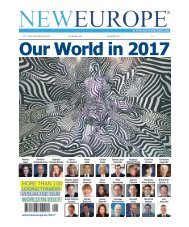Our World in 2018
Leading minds reflect on the state of our societies, and examine the challenges that lie ahead. An edition dedicated to generating ideas that will help form a new vision for our world.
Leading minds reflect on the state of our societies, and examine the challenges that lie ahead. An edition dedicated to generating ideas that will help form a new vision for our world.
Create successful ePaper yourself
Turn your PDF publications into a flip-book with our unique Google optimized e-Paper software.
OUR POLITICAL SOCIETIES
Has dealing with Pride and Prejudice
become a challenge for media?
By Lieven Taillie
A
most moving event in 2017 was
when a crowd in Manchester, after a
minute’s silence to honor the memory
of 22 people killed by a terrorist bombing
following the concert given on May 22 by
US singer Ariane Grande in the Manchester
Arena, spontaneously began to sing the
Touching is also the comment given to The
Guardian’s reporter by the lady who struck
C
taken up by the crowd:
“I love Manchester, and Oasis is part
of my childhood,” she told the Guardian.
“Don’t Look Back in Anger – that’s what this
is about: we can’t be looking backwards to
what happened, we have to look forward
to the future.”
In 2017 mostly angry voices expressed in
separatist votes (Catalunya most explicitly),
politics of nationalists, shooting incidents,
terrorist attacks, populism …. came more
eminently to the forefront. One essential
element in nationalism in European
tradition is to revisit the past, to look back
and to capitalize on anger that comes out
of a lack of recognition.
“In traditional media we try to explain,
to see differences, but we have more
difficulty in understanding it.” It is the
interesting point of view Charlie Beckett
from Polis, media think tank of London
School of Economics(LSE), defends in an
interesting article http://blogs.lse.ac.uk/
polis/2017/08/28/journalisms-new-missionunderstanding-the-human/
.
In his eyes the journalism produced
is still very self-referential. This view
offers indeed a possible explanation for
the difficulties many correspondents
encounter to understand e.g. the success of
Lieven
Taillie
Lieven Taillie is
president of the
Belgian section of
the Association of
European Journalists
and writes this in his
personal capacity.
One essential element
in nationalism in
European tradition
is to revisit the past,
to look back and to
capitalize on anger
that comes out of a
lack of recognition.
Trump in the USA, the Brexit vote, the AFD
success in Germany, and so much more
that is emblematic for what is happening
today in (international) politics. For Beckett
there is a huge amount of innovation out
there with news brands moving onto new
platforms such as Instagram or Whatsapp
to reach out to where the public are having
their conversations and getting their
information. But even when it is done well
the primary motive for this engagement is
short-term commercialism.
Connect the user to your content in
the hope they stick around long enough
to sign up for a subscription. The danger
exists that, though journalists see the
potential advantages of understanding
what is going on in the streets of our cities
and in our communities, media give in to
a certain spirit of business that is pushing
and only as consumers, not as the more
complex persons they are. New evolutions
118 2018 | OUR WORLD










